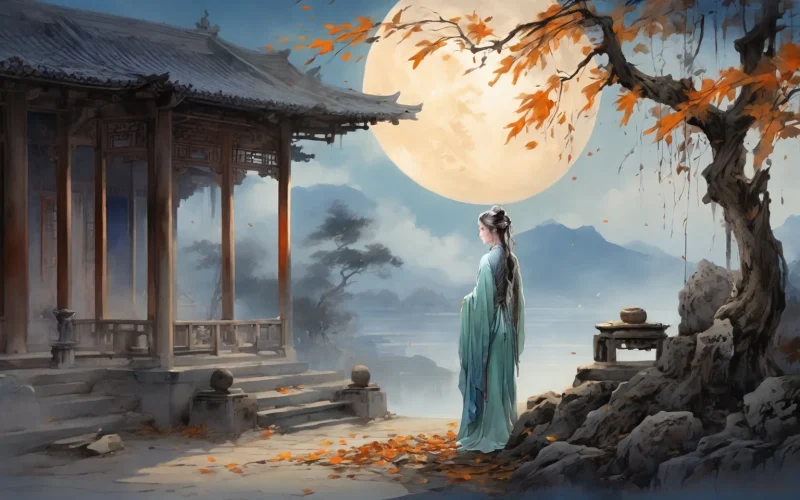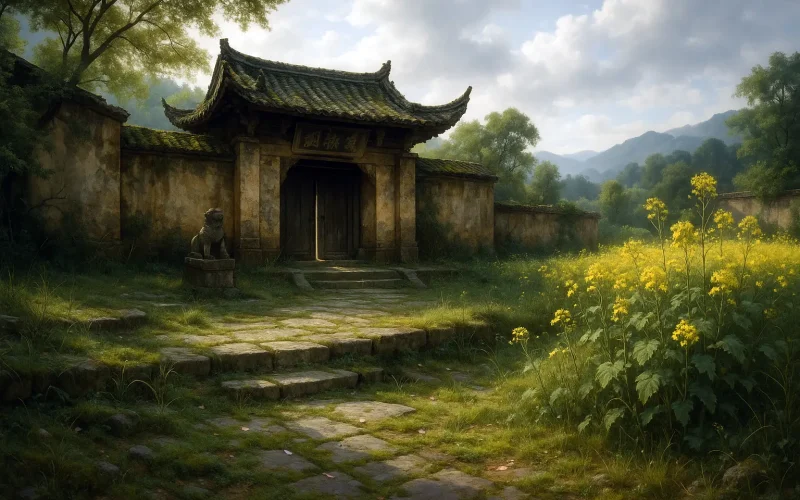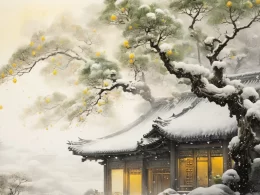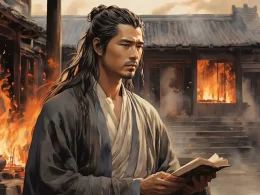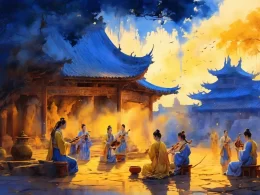The Shangyang Palace maid,
Her hair grows white, her rosy cheeks grow dark and fade.
The palace gate is guarded by eunuchs in green.
How many springs have passed, immured as she has been!
She was first chosen for the imperial household
At the age of sixteen; now she's sixty years old.
The hundred beauties brought in with her have all gone,
Flickering out through long years, leaving her alone.
She swallowed grief when she left home in days gone by,
Helped into the cab, she was forbidden to cry.
Once in the palace, she'd be favored, it was said;
Her face was fair as lotus, her bosom like jade.
But to the emperor she could never come nigh,
For Lady Yang had cast on her a jealous eye.
She was consigned to Shangyang Palace full of gloom,
To pass her lonely days and nights in a bare room.
In empty chamber long seemed each autumnal night;
Sleepless in bed, it seemed she'd never see daylight.
Dim, dim the lamplight throws her shadow on the walls;
Shower by shower on her windows chill rain falls.
Spring days drag slow;
She sits alone to see light won't be dim and low.
She's tired to hear the palace orioles sing and sing,
Too old to envy pairs of swallows on the wing.
Silent, she sees the birds appear and disappear,
And counts nor springs nor autumns coming year by year.
Watching the moon o'er palace again and again,
Four hundred times and more she's seen it wax and wane.
Today the oldest honorable maid of all,
She is entitled Secretary of Palace Hall.
Her gown is tightly fitted, her shoes like pointed prows;
With dark green pencil she draws long, long slender brows.
Seeing her, outsiders would even laugh with tears;
Her old-fashioned dress has been out of date for years.
The Shangyang maid, to suffer is her fate, all told;
She suffered while still young; she suffers now she's old.
Do you not know a satire spread in days gone by?
Today for white-haired Shangyang Palace maid we'll sigh.
Original Poem:
「上阳白发人」
白居易
上阳人,上阳人,红颜暗老白发新。
绿衣监使守宫门,一闭上阳多少春。
玄宗末岁初选入,入时十六今六十。
同时采择百余人,零落年深残此身。
忆昔吞悲别亲族,扶入车中不教哭。
皆云入内便承恩,脸似芙蓉胸似玉。
未容君王得见面,已被杨妃遥侧目。
妒令潜配上阳宫,一生遂向空房宿。
宿空房,秋夜长,夜长无寐天不明。
耿耿残灯背壁影,萧萧暗雨打窗声。
春日迟,日迟独坐天难暮。
宫莺百啭愁厌闻,梁燕双栖老休妒。
莺归燕去长悄然,春往秋来不记年。
唯向深宫望明月,东西四五百回圆。
今日宫中年最老,大家遥赐尚书号。
小头鞋履窄衣裳,青黛点眉眉细长。
外人不见见应笑,天宝末年时世妆。
上阳人,苦最多。
少亦苦,老亦苦,少苦老苦两如何!
君不见昔时吕向美人赋,
又不见今日上阳白发歌!
Interpretation:
"The White-haired Palace Maid" is one of Bai Juyi's long narrative poems, depicting the tragic life of an aging palace maid in Shangyang Palace. Written during Bai Juyi's exile in Jiangzhou, the poem reflects his sympathy for the weak and powerless, exposing the helplessness and sorrow of women under the authority of feudal emperors. Through the detailed depiction of the maid's life experiences, Bai reveals the oppression and destruction of humanity in feudal society.
First Couplet: “上阳人,上阳人,红颜暗老白发新。”
(The Upper Palace Lady, the Upper Palace Lady, her youthful beauty fades, and her white hair grows anew.)
The repetition of “Upper Palace Lady” highlights her tragic presence, emphasizing the loss of her youth and vitality. The stark contrast between fading beauty and the relentless emergence of white hair portrays the passage of time and the harsh reality of her confined life, filled with sorrow and despair.
Second Couplet: “绿衣监使守宫门,一闭上阳多少春。”
(The green-clad palace guards keep watch at the gates, shutting the Upper Palace for countless springs.)
This couplet juxtaposes the vibrant green of the guards’ uniforms with the stagnant, lifeless existence behind the palace gates. The imagery of time passing—“countless springs”—intensifies the atmosphere of confinement, symbolizing how these women’s lives are consumed in silent suffering.
Third Couplet: “玄宗末岁初选入,入时十六今六十。”
(In the late years of Emperor Xuanzong’s reign, I was chosen at sixteen; now, I am sixty.)
This line establishes the timeline of her tragic life. From a promising youth to the decay of old age, the fleeting nature of time is starkly contrasted with the constancy of her imprisonment. Her words evoke profound pity for a life squandered in isolation.
Fourth Couplet: “同时采择百余人,零落年深残此身。”
(At the same time, over a hundred were chosen, but as years passed, only my frail body remains.)
The fate of the women selected alongside her underscores the shared tragedy of these palace women. “Withered and wasted” captures not only physical decline but also the emotional toll of decades spent in despair, highlighting the dehumanizing effects of the imperial system.
Fifth Couplet: “忆昔吞悲别亲族,扶入车中不教哭。”
(I recall swallowing my sorrow as I bid farewell to my family, helped into a carriage, forbidden to cry.)
Her recollection reveals the inhumanity of a system that demanded these women suppress even their grief. The forced departure from family signifies the loss of their freedom and individuality, painting a grim picture of societal norms.
Sixth Couplet: “皆云入内便承恩,脸似芙蓉胸似玉。”
(They said entering the palace meant receiving favor, as beautiful as lotuses, with jade-like bosoms.)
The deceptive allure of entering the palace is exposed here. The promises of favor and admiration serve only as a cruel mockery of the reality these women face, symbolizing the hollow ideals imposed on them.
Seventh Couplet: “未容君王得见面,已被杨妃遥侧目。”
(Before I could even meet the Emperor, Lady Yang cast a jealous glance my way.)
This couplet marks the pivotal moment of the speaker’s descent into neglect. Jealousy becomes a tool of suppression, redirecting imperial favor and condemning her to a life of irrelevance, magnifying her sense of injustice.
Eighth Couplet: “妒令潜配上阳宫,一生遂向空房宿。”
(Her jealousy exiled me to the Upper Palace, where I lived alone in an empty room for life.)
The Upper Palace becomes a prison of solitude, symbolizing the futility of her existence. The transition from potential favor to permanent exile is both immediate and irrevocable, illustrating the fragility of her circumstances.
Ninth Couplet: “宿空房,秋夜长,夜长无寐天不明。”
(In the empty room, autumn nights stretch long, sleepless and waiting for dawn.)
The desolation of her environment mirrors her internal torment. Autumn, often a symbol of decline, paired with the imagery of restless nights, captures the depth of her despair and longing.
Tenth Couplet: “耿耿残灯背壁影,萧萧暗雨打窗声。”
(The dim lamp casts shadows on the wall, while the dreary rain beats against the window.)
The oppressive stillness of the room is broken only by these small, melancholy sounds. The interplay of light and shadow, along with the rain’s rhythm, creates an intimate yet sorrowful scene that deepens the reader's empathy.
Eleventh Couplet: “春日迟,日迟独坐天难暮。”
(Spring days linger; I sit alone, feeling the day will never end.)
Spring, traditionally a time of renewal, is portrayed here as unending and oppressive. This inversion of seasonal symbolism underlines the monotony and sorrow of her existence.
Twelfth Couplet: “莺归燕去长悄然,春往秋来不记年。”
(Orioles return and swallows depart in silence; spring passes to autumn, and the years are forgotten.)
The cyclical migration of birds and the passage of seasons illustrate the relentless flow of time. Her inability to mark the years reflects the erasure of identity and agency under the imperial system.
Thirteenth Couplet: “唯问深宫望明月,东西四五百回圆。”
(I only ask the bright moon above, which has waxed and waned four or five hundred times in this palace.)
The moon, an emblem of constancy, contrasts with the speaker’s unchanging fate. Her interaction with the moon becomes a metaphor for the silent witness of her suffering, amplifying the poem’s themes of loneliness and endurance.
Final Couplet: “君不见昔时吕向美人赋,又不见今日上阳白发歌!”
(Do you not see Lü Xiang’s ode to beauties of the past, nor hear today’s song of the white-haired Upper Palace Lady?)
The comparison to Lü Xiang underscores the irony of beauty’s fleeting nature and its inability to shield against suffering. The speaker’s lament transforms into a universal critique of the temporal and societal forces that value appearance over humanity.
Literary Features:
- Representative Subject: The poem uses the story of a typical palace maid to expose the oppression of women in feudal society.
- Detailed Depiction: Vivid descriptions capture the maid’s despair and numbness, along with the loneliness of palace life.
- Rich Techniques: The integration of narrative, scenery, and emotion deepens the melancholic tone.
- Plain Language: The simple yet poignant language enhances the poem’s emotional impact.
Overall Analysis:
The poem portrays the maid’s solitude and suffering from youth to old age, merging narrative, imagery, and emotion to detail her decades of confinement. By highlighting the interplay between the desolate environment and the maid’s inner turmoil, Bai Juyi elevates her personal tragedy into a critique of the feudal system. The straightforward yet powerful language reflects the poet’s empathy and sharp social criticism, imbuing the work with profound realism and significance.
Insights:
The poem reveals the deprivation of choice and happiness inflicted upon individuals, particularly women, by feudal systems. Through the maid’s tragic fate, Bai Juyi critiques the indulgence of feudal emperors and societal injustice. This poem calls for the respect of individual dignity and rights, reminding us that every life deserves freedom and value. It urges future societies to prioritize human rights and fairness while reflecting on the lessons of history.
Poem translator:
Xu Yuan-chong (许渊冲)
About the poet:

Bai Juyi (白居易), 772-846 AD, was originally from Taiyuan, then moved to Weinan in Shaanxi. Bai Juyi was the most prolific poet of the Tang Dynasty, with poems in the categories of satirical oracles, idleness, sentimentality, and miscellaneous rhythms, and the most influential poet after Li Bai Du Fu.





